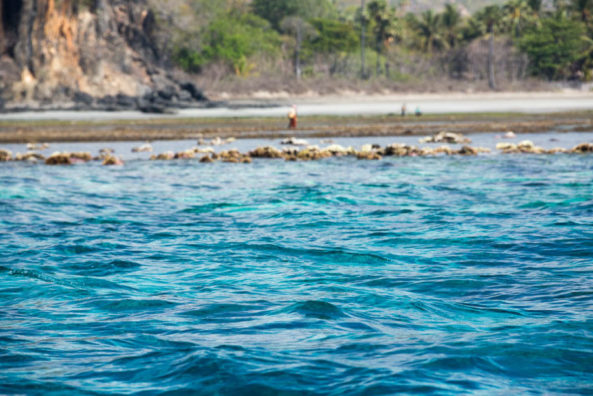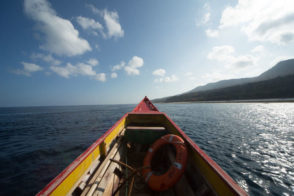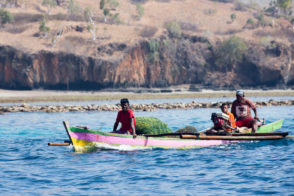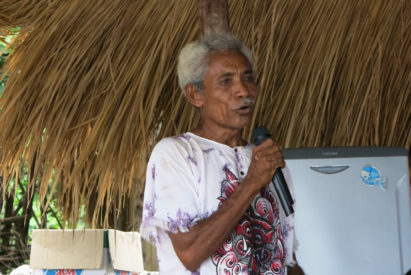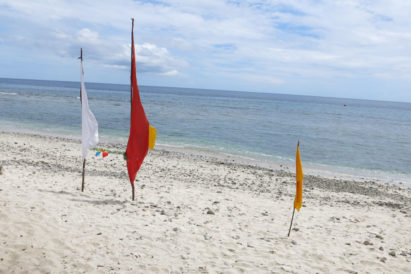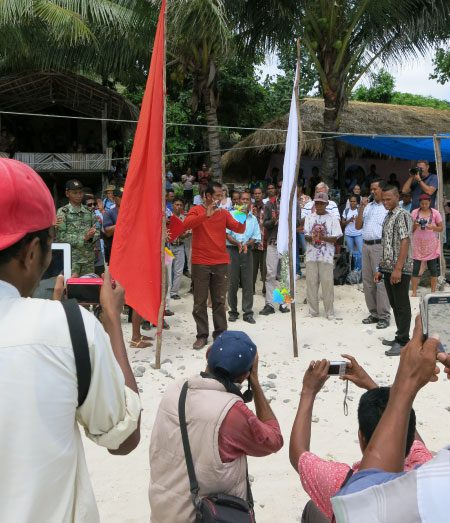When asked to describe our island home of Ataúro, the first word I usually find is “imposing”. From the shores of Dili, Timor-Leste’s seaside capital, Ataúro looms offshore above the horizon with few discernible features other than its dramatic mountainous interior. Yet on the approach across the deep waters of the Wetar Strait, Ataúro’s exposed layers of strata and stepped fossil reefs come into focus. Many of these ancient raised platforms take the form of sheer cliffs that crown the southern and western coasts of the island, leaving a thin band of coastline at sea level where a handful of communities, like the village of Adara, have taken root.
Taking my seat in a small longtail boat from Beloi, Ataúro’s ‘capital’ village and our base on the island, I joined a fleet of small boats making its way to Adara from across the island to celebrate a conservation milestone for the village, which − it is hoped − will provide a conservation blueprint for coastal communities in Timor-Leste. Many coastal communities on Ataúro are unable to venture into the challenging offshore waters of the Wetar Strait and the Banda Sea, leaving little choice but to exploit vulnerable near-shore reef fisheries, which are producing ever decreasing catches. Fearful of the threat to future livelihoods, the Adara community has worked with fisheries experts from WorldFish to initiate management measures to safeguard their local marine resources for future generations.
For the past two years, the Adara community has worked with WorldFish to build understanding of local marine resource use practices. There is a strong tradition of women taking responsibility for fishing in Adara, with the village’s “Wawata Topu” (women divers in the Rasua dialect of western Ataúro) featuring in an award-winning documentary of the fabled ‘mermaids’ of Timor-Leste.
This collaboration has resulted in a model of marine conservation previously unseen on Ataúro. After extensive local consultation, the village designated a local area of reef previously used for fishing as a permanent no-take zone. In doing so, Adara has joined a growing global movement of communities taking action to manage their own fisheries to safeguard the biodiversity underpinning livelihoods and food security. So called Locally Managed Marine Areas (LMMAs) have proven to be a powerful tool for community led marine conservation, putting communities at the centre of marine protection and fisheries management efforts.
Adara’s new LMMA has been enforced using traditional tara bandu law; a type of traditional Timorese social code used at the community level to establish local rules and conventions, including resource use practices. Full community agreement is critical to both the establishment and observation of the tara bandu, and the Adara community recognised that this customary system was critical to the LMMA’s success. Alongside the marine reserve, the community has used the tara bandu code to prohibit a number of destructive fishing practices including dynamite and poison fishing and the use of nets with a mesh size less than 1” (2.5cm). Together, this represents an extremely comprehensive and powerful community authored marine management legislation, and the ceremony to inaugurate this landmark event was well attended.
Representatives of government departments and Timorese television and radio took their places alongside community leaders from across the island to witness the ceremony, with speakers pledging to support and observe the tara bandu, and traditional blessings marking the ceremonial launch of the LMMA. As I boarded our boat to leave Adara at the end of a moving shoreside ceremony, I was reminded of my previous work with Blue Ventures in Madagascar, where I witnessed the successes that can occur when a community is empowered to take responsibility for managing their marine environment and fisheries. These early experiences of Timor-Leste’s first steps towards community-led marine management bode well for similar models of conservation in this global marine biodiversity hotspot.
Cover image: Jen Craighill
Find out more about our work building capacity for locally led marine conservation
Blue Ventures would like to thank our supporters and funders including the GEF through UNEP under the Dugong and Seagrass Project and Wilstar.


